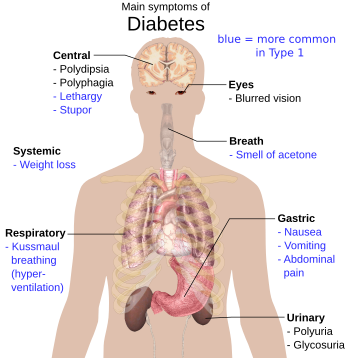People with diabetes should have their own eating plan. A good doctor or dietitian can work with you to develop an eating plan for you and your family. As reported by Wikipedia, “Diabetes mellitus (DM), commonly referred to as diabetes, is a group of metabolic diseases in which there are high blood sugar levels over a prolonged period. Symptoms of high blood sugar include frequent urination, increased thirst, and increased hunger. If left untreated, diabetes can cause many complications. Acute complications can include diabetic ketoacidosis, nonketotic hyperosmolar coma, or death. Serious long-term complications include heart disease, stroke, chronic kidney failure, foot ulcers, and damage to the eyes.
Diabetes is due to either the pancreas not producing
enough insulin or the cells of the body not responding properly to the insulin
produced. There are three main types of diabetes mellitus:
Type 1 DM, results from the pancreas's failure to
produce enough insulin. This form was previously referred to as "insulin-dependent
diabetes mellitus" (IDDM) or "juvenile diabetes". The cause is
unknown.
Type 2 DM, begins with insulin resistance, a
condition in which cells fail to respond to insulin properly. As the disease
progresses a lack of insulin may also develop. This form was previously
referred to as "non insulin-dependent diabetes mellitus" (NIDDM) or
"adult-onset diabetes". The primary cause is excessive body weight
and not enough exercise.
Gestational diabetes is the third main form and
occurs when pregnant women without a previous history of diabetes develop high
blood-sugar levels.”
What
are the symptoms of Diabetes?
The classic symptoms of untreated diabetes are:
1. Weight loss.
2. Polyuria (increased urination).
3. Polydipsia(increased thirst).
4. Polyphagia (increased hunger).
These symptoms may develop rapidly that is within weeks
or months as in type 1 DM, while they usually develop much more slowly and
may be subtle or absent in type 2 DM.
“Several other signs and symptoms can mark the onset
of diabetes although they are not specific to the disease. In addition to the
known ones above, they include blurry vision, headache, fatigue, slow healing
of cuts, and itchy skin. Prolonged high blood glucose can cause glucose
absorption in the lens of the eye, which leads to changes in its shape,
resulting in vision changes. A number of skin rashes that can occur in diabetes
are collectively known as diabetic dermadromes.”
The
role of food is Diabetes prevention and management
There is a lot of hoopla about the food you eat if
you are diabetic. Here is the good news! People with diabetes do not need
special foods. The foods on your diabetes eating plan are the same foods that
are good for everyone in your family! However, you must try to eat foods that
are low in fat, salt, and sugar and high in fiber such as beans, fruits and
vegetables, and grains. Eating right will help you:
1.
Reach and stay at a weight that is good for your body.
2.
Keep your blood sugar in a good range.
3.
Prevent heart and blood vessel disease.
People with diabetes should have their own eating
plan. A good doctor or dietitian can work with you to develop an eating plan
for you and your family. Your dietitian can help you plan meals to include
foods that you and your family like to eat and that are good for you. Eating
right is all you need even if you are diabetic and you can live with it.

